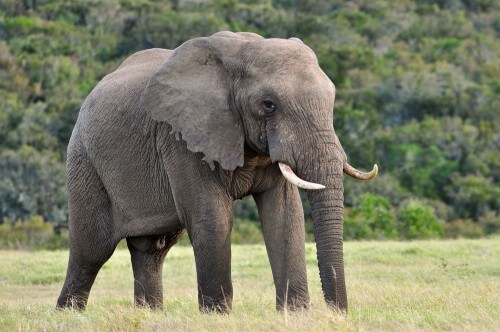African elephants are being killed en masse. Every year the elephant population (in Africa) lost about 7%, it is accepted that the birth rate in the elephant population is between 3% and 5%, which means that every year fewer elephants are born than are killed.

A few days ago, the world celebrated "Elephant Day" with the aim and intention of drawing public attention to the sad state of the populations of the large and impressive terrestrial mammal that has existed for tens of thousands of years, but due to beliefs and traditions that feed greed, the continued existence of the elephant populations is in doubt.
In the journal PNAS A survey is published according to which the killing of elephants in Africa has reached a situation where every year fewer elephants are born than those killed/murdered for "commercial" purposes.
Despite the difficulty in an exact count, according to various estimates that are based on finding carcasses, on "seizures" of smuggled tusks and data from annual surveys in one year (since 2008), about 35,000 elephants are hunted.
According to estimates, until the arrival of the "white hunter" in Africa there were about one and a half million elephants, following a wild poaching in the XNUMXs, about half a million remained, and then regulations were amended and laws were enacted to protect and preserve the population, and indeed the population stabilized and in some places even increased. But then came the economic development of East Asian countries, especially China, economic development caused a growing demand for expensive "goods" and when the goods are elephant tusks.
African elephants are being killed en masse. Every year the elephant population (in Africa) lost about 7%, it is accepted that the birth rate in the elephant population is between 3% and 5%, which means that every year fewer elephants are born than are killed.
The "black" trade in wild animals and natural products has reached an alarming and frightening level, a situation that causes the destruction of species of high economic value to hunters and smugglers, the economic value stands in the way of conservation attempts mainly in places where the political / social situation lacks stability. According to the "seizures" of tuskers at the border crossings, it turns out that most of the "goods" are destined for Asia in general and China in particular, where there is a black market in ivory.
The selective killing ("selective") in which they kill the adults (those with tusks) in the family leaves many orphans, the adults continue their lives in the wild. Some of the young people end up in orphanages (for elephants), these are also lost for the population in the wild as they lack the social skills that are so important in elephant society.
Males who grow up without a family become aggressive for everyone in the area, animals and people alike, and are not accepted by families and herds, therefore the chances of orphans raised in orphanages and released into the wild to assimilate into Philistine society are also low. In other words, the killing causes the destruction of the social "culture" of the elephants.
Environmentalists have been claiming for many years that the condition of elephants is bad, but the survey clearly shows the approaching extinction.
Although there are healthy and growing populations of elephants in a number of countries (for example Botswana), in other countries (Central and West Africa) the killing offsets these populations as well. If the killing does not stop, within 100 years the elephant population will be extinct.
As the general secretary of Sits, John Scanlon, says, "The world must decide how much effort should be invested in the preservation of the great species" and I will add (as usual) that the time has come that instead of controlling the environment for the sake of the human population, there should be control of the human population for the sake of the environment!
On the same topic on the science website
A petition to stop the killing of elephants
Protecting the elephants against the ongoing killing
UN Security Council for Elephants

5 תגובות
It seems to me that humans and elephants cannot live together. That is why there was a need for special nature reserves for elephants. Maybe even outside of Africa. For example, large enclosures from the book in Ramat Gan, which proved the breeding of elephants.
In the end, only Muslims and gooks will remain
Mirom Golan
You're kidding, right? The free market has destroyed most of the world's fish. Only in places with a strong government are there still fish.
Without government supervision there would be no rhinos, tigers or pandas in the world today.
to Mirum
A mistake... there are private reserves in Kenya and Daraf, and they are also where the criminals work and kill rhinos and elephants,
In contrast, in Botswana and Namibia, illegal hunting is minimal.
This is how it is when countries are entrusted with the task of protecting nature and animals - they have no idea how to do it.
If the lands were privately owned - no hunter would carry out his plot and avoid punishment.